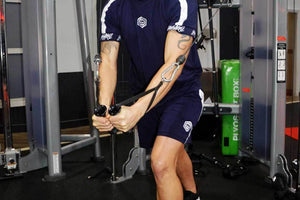Whether you’re an avid runner, a recreational lifter, or a lifelong tennis player, you know that what you eat is key both for optimal performance as well as recovery. However, some people are so enthusiastic about fuelling their workouts with the right ingredients that they neglect the equally important role of their recovery. After all, this is when all of your muscle growth happens and the effects of your training take place to help you advance.
In addition to your macros, which are always vital for your health and well-being, taking care of your micro-nutrient intake will help you recuperate faster and restore your energy more efficiently. One mineral in particular deserves more attention for improving your post-workout healing – magnesium!
Magnesium’s main roles
Just like every other essential micro-nutrient, magnesium is a meddler – it plays many vital roles in numerous metabolic processes in the body. This minuscule mineral takes part in over 300 biochemical reactions, from how your body generates energy, how it utilises other micro-nutrients you eat in your food, all the way to protecting your very DNA.
Your vital organs such as you brain and heart heavily depend on your magnesium supplies to function properly every day. However, it’s also the building block of your bones, just like calcium, and it balances your cholesterol levels, allowing your muscles to relax and recover from physical strain. Even with just these several functions, it’s already clear how crucial magnesium is for everyone who leads an active life, since your energy and performance are based in magnesium availability, as much as any other essential macro and micro-nutrient.
Deciding on your needs
The general guidelines when it comes to this handy mineral state that an average man requires approximately 400 to 420mg of magnesium per day, while women need slightly less, in the realm of 310 to 320mg per day. However, these numbers fluctuate depending on your lifestyle, any pre-existing conditions such as diabetes or high blood pressure, how active you are every day, what your diet consists of, and whether you are pregnant.
Then again, athletes – and endurance athletes in particular – may need more magnesium to help their bodies cope with muscle soreness and cramps as well as arduous routines. You don’t necessarily need to be a competitive athlete to find yourself depleted of magnesium, since you may need a higher dosage than someone who exercises significantly less in terms of both intensity and frequency – which is where your doctor should step in and check if you should up your intake.
Sources of magnesium
This crucial mineral is as hard to come by as it is essential to your well-being, making it one of those elusive dietary requirements that is hard to meet, especially through diet alone. Nuts and seeds such as almonds, peanuts, pumpkin seeds, and dairy as well as dark greens such as spinach and broccoli have high amounts of magnesium, although its bio-availability may vary. Typically, your body will absorb as little as 30-40% of the eaten magnesium, which often leads athletes to rethink their diets.
For those who exercise vigorously, it’s often recommended to take magnesium supplements in order to improve their energy levels and recover faster. They are designed to be absorbed more easily without causing any harm to your digestive tract, increasing your daily intake without increasing your calories through magnesium-packed foods.
Symptoms of a deficiency
Although some of the following symptoms are very commonly associated with other health issues and they can be seen as mere reactions to a stressful situation, it’s important to listen to your body and notice if these symptoms persist:
- General fatigue
- Headaches
- Muscle spasms and cramps
- Trouble sleeping
- Carb cravings
- Numbness in your hands and feet
- Irregular heartbeat
If you feel that your workouts are becoming increasingly difficult even though you’re resting properly and not increasing the intensity of your workouts, chances are that you are starting to experience a magnesium deficiency. It’s best to talk to your physician and do a few tests to confirm if you have this particular issue in order to find the best solution – your body will thank you later!
Key perks to expect
Finally, as difficult as it may be for some to believe that this one micro-nutrient is so priceless for your muscles, bones, and energy, you can begin by getting a deeper insight into how you’ll feel when you actually provide your body with enough of this mineral.
- Improved muscle gains – Since magnesium is one of those vital ingredients in the process called muscle protein synthesis, which occurs well after you finish your workout, it stimulates your muscles to repair and build new tissue. Without it, your muscles cannot repair and recover properly, making it very difficult to advance in terms of improving your physique with lean muscle.
- Better carb and fat metabolism – Yes, this little rascal also plays a key role in how your body uses carbs to generate energy, and how efficient you are at burning fat. So, if your goal is to improve your body composition and replace those love handles with lean muscle, magnesium is your body’s best friend.
- Quality sleep – As the third pillar of a healthy lifestyle, right next to diet and exercise, sleep is connected to your magnesium levels. Enough of this mineral helps your body relax after training, reduces inflammation in your body, replenishes energy stores, and soothes your entire central nervous system to sleep.
There can be no muscle protein synthesis, or restored energy without sleep, so magnesium is the ingredient that closes this recovery cycle and turns it into a powerful bodily process you need to advance in your athletic endeavors and stay healthy.
About the author: Luke is a fitness and health blogger at Ripped.me and a great fan of the gym and a healthy diet. He follows the trends in fitness, gym and healthy life and loves to share his knowledge through useful and informative articles.






























































